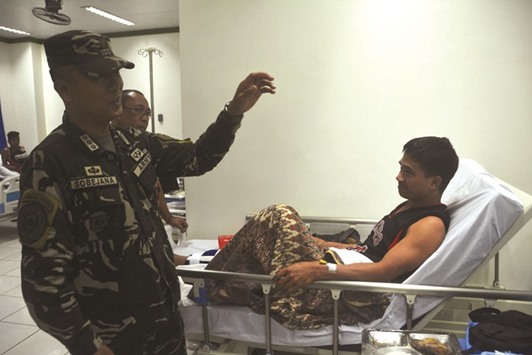Philippine soldiers clashed with Islamist militants behind the beheading of a German hostage in a bloody gun battle on the insurgents’ remote stronghold that left 11 troops injured, the army said yesterday.
The Abu Sayyaf, a kidnap-for-ransom network in the southern Philippines that has declared allegiance to the Islamic State group, killed Jurgen Kantner, 70, on Sunday after its demands for 30mn pesos ($600,000) were not met.
Philippine troops exchanged fire with the militants for around 45 minutes on Wednesday, said Colonel Cirilito Sobejana, head of an anti-terror task force in the troubled southern island of Jolo.
“There were eleven (wounded in) total. Two from gunshot wounds and all others from shrapnel of an M203 (grenade),” he told reporters referring to the Philippine soldiers injured during the clash.
Asked if the group in the clash was the one behind Kantner’s death, Sobejana said: “Yes, they are the ones responsible.”
Two of the militants were killed and five wounded in the battle, he added.
He also stressed that the military was still seeking to recover Kantner’s remains.
“It is a relentless effort.
Until we find the body or the head, we will not stop,” Sobejana said.
Philippine President Rodrigo Duterte apologised on Tuesday for failing to save the elderly German hostage and said the military had stepped up operations against Abu Sayyaf.
Kantner, 70, was abducted from his yacht in waters off the southern Philippines in November with his female companion Sabine Merz, found dead on the vessel with a gunshot wound.
The Abu Sayyaf have been kidnapping foreigners and locals for decades and holding them for ransom in the southern jungles.
They are believed to still hold at least 19 foreigners and six Filipino hostages.
The group, formed from seed money provided by a relative of Al Qaeda mastermind Osama bin Laden in the 1990s, also carried out the bombing of a ferry in Manila Bay in 2004 that claimed 116 lives in the country’s deadliest terror attack.
Despite numerous military operations over the years, the Philippine government has failed to destroy the group.
The Abu Sayyaf benefits from the support of local communities, the lure of ransom money and even collusion with corrupt local officials.

A Philippine military officer visits a soldier, wounded after a clash with the Abu Sayyaf group.
